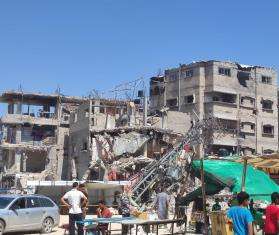Humanitarian Aid Programs Suspended; Cholera Victims at Risk
Nairobi, March 29, 2001 — Doctors Without Borders/Médecins Sans Frontières (MSF) today condemned Tuesday's violent attack on its compound and humanitarian aid workers in Mogadishu North, Somalia. In a statement today, the organization confirmed that it has suspended operations in the capital and warned that ordinary people would suffer unless parties in the conflict respect the impartial, humanitarian mandate of organizations like MSF. MSF warned that cholera victims are now at risk of dying in Mogadishu North because supplies have been looted and destroyed.
MSF has brought medical relief to Somalia since the beginning of the civil war in 1989, and in Mogadishu since 1991, no matter who was in control. Although MSF has had security incidents in Mogadishu before, this is the worst of its kind, and was completely unexpected and unexplained. MSF condemns the attack and calls on the parties in the conflict to respect the security and humanitarian mandate of MSF workers in Somalia. MSF is also concerned about the safety of the four UN workers, who were involved in the incident, and who are still unaccounted for in Mogadishu.
"Whatever the reason behind the attack, targeting impartial aid workers is totally unacceptable and only harms the very people we are trying to help. People are now at risk of dying from cholera," said MSF Medical Coordinator, Elena Grandio, who was evacuated yesterday night.
On Tuesday morning, three international aid workers, over 30 national staff from MSF and six international UN workers were trapped and under fire for two hours, when the MSF compound was unexpectedly surrounded and attacked. The UN workers came to the MSF compound to attend a meeting on EPI/immunization program and cholera treatment.
The compound was then completely looted. Three months of medical supplies for twelve Out-Patient-Departments and seven Mother and Child Health Centers in Mogadishu (80,000 consultations per year), Giowhar (91,000 consultations per year) and Aden Yabal (70,000 consultations per year), were also looted or destroyed.
"After ten years of bringing medical assistance to people in Mogadishu, no matter who was in control, it is very upsetting to see essential medical supplies strewn all over the streets and to have to suspend our programs," adds Elena Grandio.
MSF runs the only public health clinic and cholera camp in the north of the city. This year the cholera epidemic began in January. At any one time, there are around 35 patients under treatment in the MSF camp, and this is how many there were on the day of the attack. The cholera treatment center also has no more supplies. Aid workers watched as 45 Kg plastic containers of chlorine were emptied and taken away to be used as buckets. The chlorine is used to disinfect 36 wells in Mogadishu North, which supply water for around 150,000 people.
MSF would like to thank Action Contre la Faim/Action Against Hunger (ACF) in Mogadishu, for their continuous logistical support during this crisis. MSF also thanks ECHO Flight for its collaboration for the evacuation.
MSF is a private impartial international humanitarian organization, which brings medical assistance to all people in need regardless of their race, politics, ethnicity, sex or religion. MSF was awarded the 1999 Nobel Peace Prize for its humanitarian assistance to victims of natural and man-made disasters. Until the attack, MSF was the only organization with international staff permanently based in Mogadishu.


